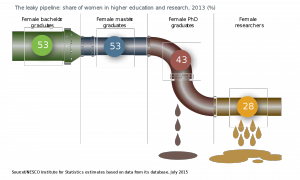August 30, 2018, by Simon Langley-Evans
Athena SWAN reflections- the leak in the Biosciences pipeline starts early
The STEM Pipeline is a term that is used to described the progression of women through the educational system in science, technology, engineering and mathematics and their subsequent progression to senior academic posts. The metaphor of a leaky pipeline is used to describe the drop out of women from this progression, which ultimately leads to a gross imbalance of men and women at higher levels in academic departments. The figure below captures that idea, though the numbers shown don’t correspond to our School. Discussing this leaky pipeline will be a major theme for this blog over the coming months, and many others have done so before me (see nice article by Eleanor Muffitt). As a School we aspire to equality and important first steps is to have a clear view of the current situation and to understand the underlying basis of trends in the data. Only then can interventions be rolled out to create a level playing field for all.

In Biosciences we have a very clearly defined leak in our pipeline of women moving from undergraduate study through to senior academic roles, which I have previously talked about in this blog. Whilst 66% of our undergraduate and Masters students are women, only 55% of postgraduate research students are women, and by the time we reach assistant professor (lecturer) level a mere 40% of our staff are women. As part of our Athena SWAN Silver submission we identified some distinct actions that will help us gain a better understanding of why our losses are so high.
Our recruitment of women to PhD degrees is below the national benchmark figure for our subject area and this is the first point at which our pipeline leaks. A lack of strong female role models may be one factor which discourages our female undergraduate and Masters students from staying in study and progressing on to do research degrees. We aim to address this through initiatives such as the Women in Biosciences Campaign and Redressing the Balance Seminars. We are also working with the University’s Careers and Employability Service to run more spotlight events that promote research careers and PhD study. Our data analysis has shown us that not only do fewer women register for PhD study in Biosciences, those who do are less likely than men to submit their thesis on time. This suggests that there may be significant barriers that make writing up more difficult for women. We intend to identify these issues through focus groups with postgraduates and then put in place support in order to improve the situation.
Considering women who move on to academic posts, it is clear that we have a number of issues to address. We know that women at the level of assistant professor tend to have higher workloads than their male counterparts. This is because they are more likely to be in teaching focused roles and they are also more likely to volunteer to take on good citizenship roles such as senior tutors, admissions tutors and engage in outreach activity. Analysis of data from the School shows us that women are more likely to leave academia than men, even if they have obtained a secure academic post as assistant professor. This is a major concern and we don’t have a clear understanding of the forces within our School which lead to these losses. Understanding this will be a high priority so that we can introduce appropriate supporting measures.
Simon Langley-Evans
Head of School of Biosciences
No comments yet, fill out a comment to be the first

Leave a Reply